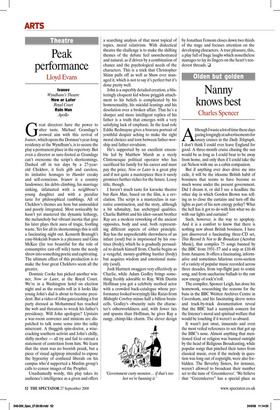Peak performance
Lloyd Evans
Ivanov Wyndham’s Theatre Now or Later Royal Court Rain Man Apollo
Great directors have the power to alter taste. Michael Grandage’s avowed aim with this revival of Ivanov, which opens the Donmar’s year-long residency at the Wyndham’s, is to secure the play a permanent place in the repertory. But even a director as sure-footed as Grandage can’t overcome the script’s shortcomings. Dashed off in ten days by a 27-yearold Chekhov, it feels glib and careless, its imitative homages to Hamlet creaky and self-conscious. Ivanov is a country landowner, his debts climbing, his marriage sinking, infatuated with a neighbour’s young daughter and with a peculiar taste for philosophical ramblings. All of Chekhov’s themes are here but unmoulded and poorly integrated. Most noticeably he hasn’t yet mastered the dynamic lethargy, the melancholy but vibrant inertia that give his later plays their aura of tragic, footling waste. Yet for all its shortcomings this is still a fascinating night out. Kenneth Branagh’s easy-blokeish Ivanov is a pleasure and Gina McKee (far too beautiful for the role of consumptive cast-off wife) turns the needy shrew into something poetic and captivating. The ultimate effect of this production is to make the four great Chekhovs seem all the greater.
Dominic Cooke has picked another winner, Now or Later, at the Royal Court. We’re in a Washington hotel on election night and as the results roll in it looks like young John’s dad is about to become president. But a video of John gatecrashing a frat party dressed as Mohammed has reached the web and threatens to wreck his father’s presidency. Will John apologise? Upstairs a war-room convenes and minions are dispatched to talk some sense into the sulky miscreant. A thuggish spin-doctor, a wisecracking southern activist and John’s chilly, shifty mother — all try and fail to extract a statement of contrition from him. We learn that the stunt was no boorish prank, but a piece of visual agitprop intended to expose the hypocrisy of confused liberals on his campus who’d supported a Muslim group’s calls to censor images of the Prophet.
Unashamedly wordy, this play takes its audience’s intelligence as a given and offers a searching analysis of that most topical of topics, moral relativism. With dialectical theatre the challenge is to make the shifting themes of the debate feel unorchestrated and natural, as if driven by a combination of chance and the psychological needs of the characters. This is a trick that Christopher Shinn pulls off as well as Shaw ever managed it, which is not to say it’s perfect but it’s done pretty well.
John is a superbly detailed creation, a blisteringly eloquent kid whose priggish attachment to his beliefs is complicated by his homosexuality, his suicidal leanings and his desolation over a broken affair. That he’s a sharper and more intelligent replica of his father is a truth that emerges with a very satisfying lack of emphasis. In the lead role Eddie Redmayne gives a bravura portrait of youthful despair aching to make the right moral choices and torn between father-worship and father-revulsion.
He’s supported by an excellent ensemble led by Matthew Marsh as a steely Clintonesque political operator who has sacrificed his family for his career and must pay the price. Now or Later is a great play and if not quite a masterpiece then it surely promises further riches for the future. Lousy title, though.
I haven’t much taste for karaoke theatre but Rain Man, based on the film, is a revelation. The script is a masterclass in narrative construction, and the story, although a bit schmaltzy, has archetypal qualities. Charlie Babbitt and his idiot–savant brother Ray are a modern reworking of the ancient opposites, body and soul, both representing different aspects of either principle. Ray has the unpredictable shrewdness of an infant (soul) but is imprisoned by his routines (body), which he is gradually persuaded to detach himself from. Charlie begins as a vengeful, money-grabbing hustler (body) but acquires wisdom and emotional maturity (soul).
Josh Hartnett swaggers very effectively as Charlie, while Adam Godley brings something freshly adorable to Ray. With Dustin Hoffman you got a celebrity method actor with a crowded back-catalogue whose performance looked worryingly like Ratzo from Midnight Cowboy minus half a billion braincells. Godley’s obscurity suits the character’s otherworldiness and, with fewer tics and spasms than Hoffman, he gives Ray a rangy, chimp-like charm. The clever design by Jonathan Fensom closes down two thirds of the stage and focuses attention on the developing characters. A true pleasure, this, a play full of huge laughs which nonetheless manages to lay its fingers on the heart’s tenderest threads. ❑










































































 Previous page
Previous page